Nazi Agent

Brief Synopsis
Cast & Crew
Jules Dassin
Conrad Veidt
Ann Ayars
Frank Reicher
Dorothy Tree
Ivan Simpson
Film Details
Technical Specs

Synopsis
Kindly German-American bookstore owner and stamp collector Otto Becker is rejoicing in a recent acquisition given to him by his friend, Prof. Jim Sterling, when his twin brother, German consul Baron Hugo von Detner pays him a visit. The brothers have not seen each other since Otto fled Nazi Germany over eight years before. Although Otto tells Hugo that he has happily become an American citizen, Hugo suggests that the bookshop would make an excellent message exchange site for German agents. Otto angrily refuses Hugo's suggestion, but when Hugo reminds Otto that he entered the country illegally, then reveals that Otto's long-time assistant, Miss Harper, is a Nazi operative, Otto knows that he has no choice. Some time later, when Otto hears a radio news report about a bombed ship and realizes that his shop was used to relay information to the saboteurs, he determines to inform the police. He tries to give a secret letter to Jim, but Miss Harper observes him and that night Hugo announces that Jim has had an "accident." Hugo draws a gun on Otto, but in an ensuing struggle, Hugo is killed. Because there are several Nazi agents waiting outside, Otto decides to shave his beard, exchange clothes with Hugo and assume his identity. Otto then goes to Hugo's apartment, where he meets dress designer Kaaren De Relle, who apparently is one of Hugo's operatives. The next morning, Fritz, Hugo's butler and an old family servant, recognizes a scar on Otto's shoulder, but says nothing. Meanwhile, Otto orders Ludwig, the consulate chauffeur, to stop the car at a cigar store and there uses a public telephone to anonymously tip the police about the two agents responsible for the sabotage. Otto then goes to Hugo's luncheon appointment and encounters Arnold Milbar, a Nazi posing as an American businessman named Frederick Williams. During lunch, Kaaren arrives and makes a point of snubbing "Hugo" when someone offers to introduce them. That evening, Otto goes to see Brenner, the head of the local Gestapo, and learns of the arrest of the two agents. Brenner and Milbar suspect a turncoat and suggest that it is Kaaren, whom Hugo had previously labeled "reluctant." Later, at the apartment, Fritz confronts Otto and explains that he hated Hugo's politics and wants to help Otto. Kaaren then arrives with information that is supposed to be passed on to Brenner, the name of a ship, the S.S. Farrington . While she is still in the apartment, Otto calls Brenner to tell him the name of the ship and say that Kaaren is absolutely reliable. Kaaren is startled that Hugo would help her and begins to soften toward him. The next evening, while Nazi agents plant explosives on the Farrington , Fritz, who knows that Kaaren is being forced to work for the Nazis to save her family, arranges for her to dine with Otto. Without revealing himself, Otto tells Kaaren that he will help her, but says that first he has a job to finish. The two then take a moonlit drive, listen to the radio and enjoy the music of Felix Mendelssohn, a Jewish composer banned by the Nazis. A few days later, Joe Aiello, who is one of Brenner's hired thugs, and trying to extort more money, inadvertently reveals to Otto that the Farrington has been rigged to explode as it passes through the Panama Canal. Otto then sends Kurt Richten, Hugo's assistant, to Brenner to report Aiello and mails papers containing the names of all Nazi agents, except Kaaren, to the FBI. He also secretly calls the police to have them stop the Farrington and arrest Aiello. Brenner and Milbar find Aiello first, but in a gunfight, Brenner and Milbar are killed, and Aiello is wounded just as the police arrive. When Miss Harper and Richten learn about Aiello's arrest, they wait for "Hugo" at Otto's shop. Because Otto's canary happily sings when he arrives, Miss Harper suspects him, so Richten goes to the consulate to investigate. There he discovers that the information on the agents is missing and telephones Miss Harper to confirm her suspicions, but the police have already come to arrest her. The next day, the other agents are apprehended and the consulate is closed. Richten then goes to Otto, threatening to expose Kaaren to the police. Nothing will dissuade Richten until Otto offers to accompany him back to Germany as a hostage to ensure Kaaren and her family's safety. After Otto makes Fritz promise to look after Kaaren but not reveal his secret, he boards a ship bound for Germany, and is humiliated by jeers from the people at the dock. As he catches his last glimpse of America, Otto is despondent, but gains strength as the ship passes the Statue of Liberty.

Director

Jules Dassin
Cast

Conrad Veidt
Ann Ayars
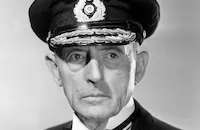
Frank Reicher

Dorothy Tree

Ivan Simpson
William Tannen
Martin Kosleck
Marc Lawrence
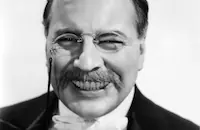
Sidney Blackmer

Moroni Olsen

Pierre Watkin
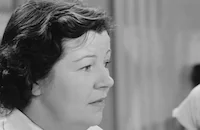
Margaret Bert
Mark Daniels
Robert Davis
Harry B. Stafford

Roger Moore
Stuart Crawford
Hal Cooke
George Noisom
Roland Varno
William Norton Bailey
Tim Ryan
Tom Stevenson
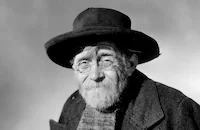
Christian Rub
Hermine Sterler
Jeff York
Jessie Arnold
Cliff Danielson

James Millican
Philip Van Zandt
George Magrill
Brick Sullivan

Joe Yule
Bernadene Hayes
Art Belasco
Charles Sherlock
William Post Jr.
Clyde Courtright
Polly Bailey
Joe Gilbert
Walter Byron
Edward Hearn
Jack Daley
Drew Demorest
Wilbur Mack
Baldy Cooke
Frank Marlowe
Ernie Alexander
Duke York

Ray Teal
Russell Simpson
Robert Homans
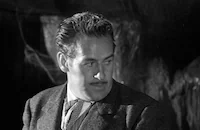
Roy Barcroft
Barbara Bedford
Crew
Tom Andre
Irving Asher
Jack Dawn
Paul Gangelin
Cedric Gibbons
Sydney Guilaroff
Lennie Hayton
Frank E. Hull
John Meehan Jr.
Lothar Mendes
Richard Pefferle
Stan Rogers
Douglas Shearer
Shoup
Harry Stradling
Edwin B. Willis

Film Details
Technical Specs

Articles
Nazi Agent
Set in the U.S. prior to the attack upon Pearl Harbor, Nazi Agent tells of German-born identical twins (both played by Conrad Veidt) who have taken widely divergent paths in life. The gentler of the two has settled in America as the owner of a rare-book store, while the other has become a Nazi officer. When the two clash, the evil twin is killed and the "good" American shaves his beard to assume his brother's identity as the leader of a spy ring. He returns to Germany (gaining strength from that glimpse of the Statue) in an attempt to spoil Nazi plans to sabotage Allied shipping routes.
Jules Dassin, who began his directing career in MGM's short-subject department, graduated to feature films with Nazi Agent. He moved on to Universal Studios, where he would direct several well-regarded crime dramas before being blacklisted during the Hollywood "witch hunt" of the 1950s. He then moved to Europe and enjoyed a successful career in England and France before entering his "Greek period" in the 1960s when he married actress Melina Mercouri, the star of Dassin's biggest hit, Never on Sunday (1960).
German-born Veidt was himself a refugee who fled from the Nazis with his Jewish wife after rising to stardom in such films as The Cabinet of Dr. Caligari (1919) and The Student of Prague (1926). He became a British citizen in 1939 and, during the early 1940s in Hollywood, played a series of commanding Nazis -- most famously in Casablanca (1942). Veidt was offered his role in that film classic during the filming of Nazi Agent.
The love interest in Nazi Agent is provided by Anne Ayars, who had begun her career as a singer in the 1930s. Active in MGM films in the early 1940s, she left Hollywood to become the New York City Opera's leading lyric soprano. She returned to movies one more time, playing Antonia in Michael Powell's The Tales of Hoffmann (1951).
Producer: Irving Asher
Director: Jules Dassin
Screenplay: Paul Gangelin, John Meehan, Jr., Lothar Mendes
Cinematography: Harry Stradling, Jr.
Original Music: Lennie Hayton
Editing: Frank E. Hull
Costume Design: Howard Shoup
Principal Cast: Conrad Veidt (Otto Becker/Baron Hugo von Detner), Anne Ayars (Kaaren De Reele), Frank Reicher (Fritz), Dorothy Tree (Miss Harper), Sidney Blackmer (Arnold Milbar).
BW-84m.
by Roger Fristoe

Nazi Agent
Jules Dassin (1911-2008) - TCM Schedule Change for Director Jules Dassin Memorial Tribute on Friday, April 20th
Sunday, April 20th
8:00 PM Naked City
9:45 PM Topkapi
TCM REMEMBERS JULES DASSIN (1911-2008)
Jules Dassin gained experience in theater and radio in New York before going to work in Hollywood in 1940, first with RKO (as assistant director) and then with MGM. Dassin hit his stride in the late 1940s with such dynamic (and still well-regarded) film noir melodramas as "Brute Force" (1947), "The Naked City" (1948), "Thieves' Highway" (1949) and "Night and the City" (1950), starring Richard Widmark who died this past Monday, March 24th.
After being blacklisted he moved to Europe, where he scored his greatest international successes with the French-produced "Rififi" (1955) and the then-scandalous "Never on Sunday" (1959), starring his second wife Melina Mercouri. For the most part, his later films--such as "Up Tight" (1968), an ill-conceived black remake of John Ford's 1935 classic "The Informer"--have been disappointing and inconclusive. Dassin, however, maintained that among his own films, his personal preference was "He Who Must Die" (1958), starring his wife Melina Mercouri. It is one of his least known films and is rarely screened today but here is a description of it: "Greece, in the 1920's, is occupied by the Turks. The country is in turmoil with entire villages uprooted. The site of the movie is a Greek village that conducts a passion play each year. The leading citizens of the town, under the auspices of the Patriarch, choose those that will play the parts in the Passion. A stuttering shepherd is chosen to play Jesus. The town butcher (who wanted to be Jesus) is chosen as Judas. The town prostitute is chosen as Mary Magdalene. The rest of the disciples are also chosen. As the movie unfolds, the Passion Play becomes a reality. A group of villagers, uprooted by the war and impoverished, arrive at the village led by their priest. The wealthier citizens of the town want nothing with these people and manipulate a massacre. In the context of the 1920's each of the characters plays out their biblical role in actuality."
Family
DAUGHTER: Julie Dassin. Actor. Mother, Beatrice Launer.
SON: Joey Dassin. Mother, Beatrice Launer.
SON: Rickey Dassin. Mother, Beatrice Launer.
Companion
WIFE: Beatrice Launer. Former concert violinist. Married in 1933; divorced in 1962.
WIFE: Melina Mercouri. Actor, politician. Born c. 1923; Greek; together from 1959; married from 1966 until her death on March 6, 1994.
Milestone
1936: First role on New York stage (Yiddish Theater)
1940: First film as assistant director Directed first stage play, "The Medicine Show 1941: Directed first short film, "The Tell-Tale Heart"
1942: Feature directing debut, "Nazi Agent/Salute to Courage"
Jules Dassin (1911-2008) - TCM Schedule Change for Director Jules Dassin Memorial Tribute on Friday, April 20th
Quotes
Trivia
Notes
Working titles for the film included House of Spies and Out of the Past. The picture was reviewed as Salute to Courage by Variety and some other sources. According to a Hollywood Reporter news item, Ludwig Stossel was cast in the production, but he was not in the released film. Another news item includes Pat O'Malley in the cast, but his appearance in the released film has not been confirmed. Nazi Agent was the first feature film directed by Jules Dassin, who had previously directed short subjects at M-G-M. After leaving M-G-M in 1947, Dassin directed two well-received films for Universal, Brute Force and The Naked City. Dassin was blacklisted in the late 1940s and moved to Europe, where he directed a number of critically regarded pictures over the next thirty years. Dassin, who was married to Greek actress Melina Mercouri, star of his 1959 film Never on Sunday, died in 1995.
















